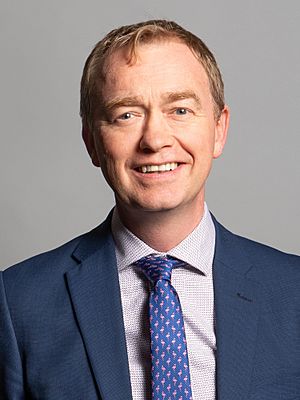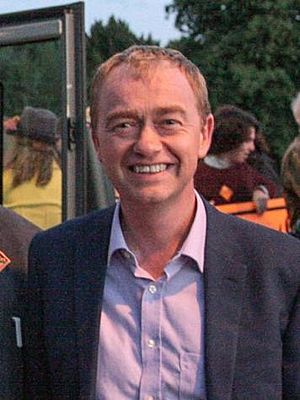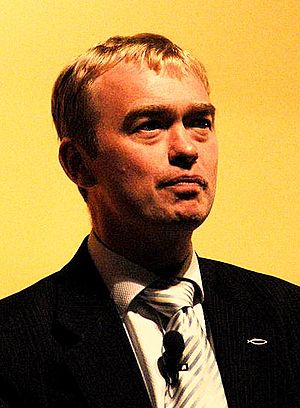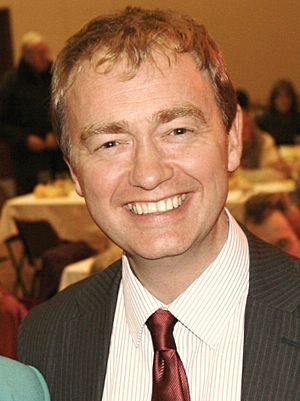Tim Farron facts for kids
Quick facts for kids
Tim Farron
|
|
|---|---|

Official portrait, 2020
|
|
| Leader of the Liberal Democrats | |
| In office 16 July 2015 – 20 July 2017 |
|
| Deputy | Jo Swinson (2017) |
| President | Sal Brinton |
| Preceded by | Nick Clegg |
| Succeeded by | Vince Cable |
| President of the Liberal Democrats | |
| In office 1 January 2011 – 1 January 2015 |
|
| Leader | Nick Clegg |
| Preceded by | Ros Scott |
| Succeeded by | Sal Brinton |
| Member of Parliament for Westmorland and Lonsdale |
|
| Assumed office 5 May 2005 |
|
| Preceded by | Tim Collins |
| Majority | 21,472 (43.3%) |
| Liberal Democrat portfolios | |
| 2008–2010, 2017–2019, 2020, 2022–present |
Environment, Food and Rural Affairs |
| 2015 | Foreign and Commonwealth Office |
| 2019–2020 | Work and Pensions |
| 2019–2020 | Northern Powerhouse |
| 2019–2022 | Housing, Communities and Local Government |
| Personal details | |
| Born |
Timothy James Farron
27 May 1970 Preston, Lancashire, England |
| Political party | Liberal Democrats |
| Other political affiliations |
Liberal (1986–1988) |
| Spouse |
Rosemary Cantley
(m. 2000) |
| Children | 4 |
| Alma mater | Newcastle University |
| Signature | |
Timothy James Farron (born 27 May 1970) is a British politician. He was the Leader of the Liberal Democrats from 2015 to 2017. He has been the Member of Parliament (MP) for the area of Westmorland and Lonsdale since 2005. An MP is a person elected to represent their local area in the government.
Before becoming a politician, Farron worked at universities. He has held many important roles for the Liberal Democrats. These include being the party's spokesperson for the environment, farming, and housing.
Contents
Early Life and Education
Tim Farron was born in Preston, England. He went to Lostock Hall High School and Runshaw College. He then studied Politics at Newcastle University and graduated in 1992. When he was young, he was interested in different politicians. He had pictures of U.S. President John F. Kennedy and former British Prime Minister Margaret Thatcher on his wall.
From 1987 to 1992, Farron was the singer for a band called Fred The Girl. He said the band was offered a record deal, but other band members have said this was not the case.
Farron became interested in politics at a young age. He joined the Liberal Party when he was 16. At university, he was elected president of the Newcastle University Students' Union. Before being elected to Parliament, he worked at Lancaster University and St Martin's College.
Becoming a Member of Parliament
Early Political Career
Farron tried to get elected to Parliament several times before he was successful. In the 1992 general election, he ran in the North West Durham area but came in third place. He also served as a local councillor in Lancashire from 1993 to 2000.
In the 2001 election, Farron ran for the Westmorland and Lonsdale seat. He came very close to winning but finished in second place.
Winning His Seat in Parliament
In the 2005 general election, Farron ran for the Westmorland and Lonsdale seat again. This time, he won by a small number of votes, just 267. He gave his first speech in Parliament on 25 May 2005. As a new MP, he became a spokesperson for youth issues for his party.
In 2008, Farron briefly left his senior role in the party. He disagreed with his party's decision on a vote about the Lisbon Treaty, which is an agreement between European countries. He later returned and became the spokesperson for the environment and farming.
From 2010 to 2015
At the 2010 general election, Farron was re-elected with a much larger number of votes. His success was unusual because many other Liberal Democrat MPs did not do as well in that election.
In 2010, he tried to become the Deputy leader of the Liberal Democrats but lost to Simon Hughes. Later that year, he was elected President of the Liberal Democrats, a role chosen by party members. He held this position until 2015.
Farron was re-elected again in the 2015 general election. After this election, the leader of the Liberal Democrats, Nick Clegg, stepped down. Many people thought Farron would be the next leader.
Leader of the Liberal Democrats

In May 2015, Farron announced he wanted to be the new leader of the Liberal Democrats. On 16 July, he won the election against his opponent, Norman Lamb.
As leader, Farron gave a speech at the Liberal Democrat Conference that was well-liked by the media. He set out seven main goals for the party. These included focusing on rural areas, mental health, housing, and the environment.
During the 2017 general election, Farron was re-elected as an MP, but with a much smaller lead of only 777 votes. After the election, he announced he would step down as party leader. He said he found it difficult to be both a faithful Christian and a political leader. He stayed as leader until Vince Cable was chosen to replace him.
Career After Party Leadership
Farron has continued to serve as the MP for Westmorland and Lonsdale. He was re-elected in the 2019 and 2024 elections. In the 2024 election, he won with a very large majority of 21,472 votes. He received more votes than any other candidate in the entire country in that election.
He has also continued to be an important spokesperson for the Liberal Democrats, especially on issues related to the environment, food, and farming.
Political Views
Farron is generally seen as having centre-left political views. This means he supports social equality and government action to help people.
Education
In 2010, Farron voted against a plan to increase the amount of money universities could charge students for their education. He believed it was important for politicians to keep their promises. The Liberal Democrats had promised not to raise these fees.
European Union
Farron strongly supported the UK staying in the European Union (EU). After the UK voted to leave the EU in 2016, he said that if his party won the next election, they would work to keep Britain in the EU.
Helping Refugees
Farron has been a strong voice for helping refugees. During a crisis in the Mediterranean Sea, he said the UK should accept up to 60,000 refugees to help. He also spoke at a march in London to show support for refugees.
Equal Representation
In 2015, Farron said he wanted the Liberal Democrats to have more female and minority ethnic MPs. He set a goal for at least half of the party's most important election candidates to be women. He also wanted 10% to be from black, Asian, and minority ethnic (BAME) backgrounds.
Personal Life
Farron is a Christian and has said that his faith is a very important part of his life. He is a vegetarian and a big fan of the Blackburn Rovers football club. He is married to his wife, Rosie, and they have four children.
In 2019, he wrote a book about his life called A Better Ambition: Confessions of a Faithful Liberal. In the book, he talks about being a Christian and a member of the Liberal Democrats.
Farron also enjoys running. He completed the 2021 London Marathon and raised money for charity.
See also
 In Spanish: Tim Farron para niños
In Spanish: Tim Farron para niños
 | Bayard Rustin |
 | Jeannette Carter |
 | Jeremiah A. Brown |



